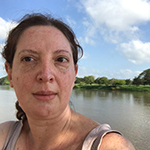Score for Fish Choir
If an air bubble breaks the surface, sends out ripples
then dark matter is the passing fish
—Rebecca Elson, A Responsibility to Awe
I.
The voices of the fish become waves on the smooth surface of the lake.
My best memories are memories of water. Hydrogen iceberg: a failed star plunging through the solar system. Sitting on the futon, unable to move my arms, I take stock of my broken bones: radius, humerus, scaphoid, ilium. The fractures match my mother’s, and my grandmother’s. Before the accident, I would have tried to find a common thread, a logical connection from one sentence to the next, but now I can only think in simultaneous fragments. Calcium precipitation, diatomic respiration, fish song.
Bilateral radial fracture: still myself, but two minutes and thirteen thousand seven hundred million light years out of time.
II.
The fish sing in the style of creatures from other worlds.
I was the one who found it. The goldfish had escaped its bowl and drowned in the air, mouth pulled wide on the kitchen floor. I was all too familiar with how that twisted little body must have felt as it suffocated. I was five then. For the first time in months I didn’t feel like I was on the verge of one of my asthma attacks that always ended with me in an oxygen chamber. It was less upsetting than it was strange, spending days inside one of those plastic capsules. Just one of the many things about living in a world whose atmosphere wasn’t entirely compatible with my makeup. I can still feel it to this day: a seven-millimeter membrane between me and everything I loved.
Laplacian growth: the rifts etched in my arms follow the courses of riverbeds on Mars.
Depression is like being underwater and forgetting the importance of returning to the surface before you run out of air. My grandmother, my mother, and I have all been submerged like this more than once, each at our own tempo. A flattening of feeling, an inability to make contact with the intelligent life of this planet. The hunger stones are revealed in times of drought, when the water level drops. “If you see me, weep,” says one of the oldest of these, in the Elbe River.
My best memories are memories of water; some of them make me cry.
III.
The fish are electrons gliding through the water. Their voices reach for the key of electric blue.
When a neutrino bumps into an atom in a given medium (heavy water, for example), it sends the atom’s electrons flying apart faster than the speed of light: the products of annihilation, Cherenkov radiation. A blue glow signaling the presence of a ghost particle.
Did she leave her luminous trace in the sea, too?
The first time I broke my left arm, she was still here.
No one tells you that you fall in love with your friends too. That when you look at them your eyes will light up and you will find yourself marveling mid-conversation at how beautiful and smart they are, each in their own way. No one warns you, either, that when one of them dies you become the keeper of all your shared memories, the ones no one else knows.
She was the only witness to the night I sat crying on the sand because I didn’t know how to swim back up to the surface, to embrace a breaking body. There, on the beach, we gazed off at a strange light in the sky and talked ourselves dizzy about the possibility of life beyond our world.
I couldn’t go to her funeral but I was there for our last conversation. We’d had an argument and she called me one Friday to make peace. We agreed to meet the following Monday and said goodbye. Then I felt an urge to call her back. When she answered, I told her I loved her.
She drowned the next day.
Dark matter: millions of ghost particles coursing through my hand as I picked the phone back up without really knowing why.
IV.
The fish swim through Van Allen belts, singing hymns of praise to the sublime indifference of the magnetic fields.
Water’s boiling point is so high because it holds the memory of being ice in its hydrogen bonds. If water boiled at a lower temperature, life on earth would be something else entirely. Molecular memory: rivers that never forget their place. Lapis lazuli sediment on the skull of a nun-scribe.
A bilateral fracture, two fissures in space-time.
I flit through different moments, none more relevant than the rest. A nostalgia for re-living what is to come: remembering when I see a strange light on the beach that one day I will follow the path of a river on Mars while in the tenth century I lick my pen and trace an ocean-blue line on the page of a manuscript.
A subterranean current links me to my mother’s body, to my grandmother’s body. My losses are theirs too. The lineage snaps. I can’t remember all of my great grandmothers’ names. Water carries away the calcium of our bones, bringing it back to the sea.
Our ancestors speak the language of fossils.
V.
The voices of the fish sustain their gentle tone through the aeons. They become waves on the smooth surface of a lake.
Anastomosis. Braided rivers, bronchial tree. Some fractures arise twenty years out of time. A hydrogen iceberg, the path of a failed star plying the universe: each of my memories a revision of the one that came before.
The crunch of my broken arms and the cluster of periwinkle eggs I accidentally squashed one summer day as I dove between the pier pilings.
I never swam there again, but the damage was done.
Translator’s Note:
Martha Riva Palacio Obón’s work centers on the interweaving of the personal and planetary forces of being alive. She places herself on a continuum of geological time, in which each memory links her to the ebb and flow of her own history and future along with those of the natural world, asking the question of how these processes and entanglements make a person who they are.
In Martha’s work we see (and hear, in the accompanying sound essay) these same deeply personal themes being interrogated through different images and media. A family history projected through the prism of the endless journey of the calcium in our bones, of the ripples of memory, friendship, lineage. Of the sound of a single cricket translated into different frequencies and rhythms to become the song of a school of fish. Both text and sound submerge the reader, the listener, in the eternal music of the planet: chirp, wave, glow, snap, bubble, gasp, crunch, weep, repeat.
Translating an essay like this makes me think about the processes of change—breakage, replacement, loss, and growth. Martha’s work is already a translation of memory into image and sound. What new associations arise when a story is told in another language? What happens to metaphor, to memory? Are they the same? What new ripples and fractures are produced when images and memories are funneled through new linguistic pathways? At what point does a thing—an object, a feeling, a person, a story—become something else? Which version is more real?

Martha Riva Palacio Obón is a Mexican sound artist and author of novels, poetry, and stories for children and adults. She won the 2014 Premio Hispanoamericano de Poesía para Niños for her illustrated poetry book Lunática, as well as the 2011 Premio Barco de Vapor for Las sirenas sueñan con trilobites (which was also selected in 2013 for the White Ravens International Children’s Library Catalog and will be published in English by Bloomsbury in 2023). Her short story “Biography of Algae” was published by Strange Horizons in 2020. She is currently at work on a collection of personal essays.

Will Morningstar is a freelance editor and translator from Boston whose translation work has appeared in Two Lines, Latin American Literature Today, Strange Horizons, and the Massachusetts Review, as well as in museums and cultural institutions throughout Spain.

 BACK TO ISSUE
BACK TO ISSUE